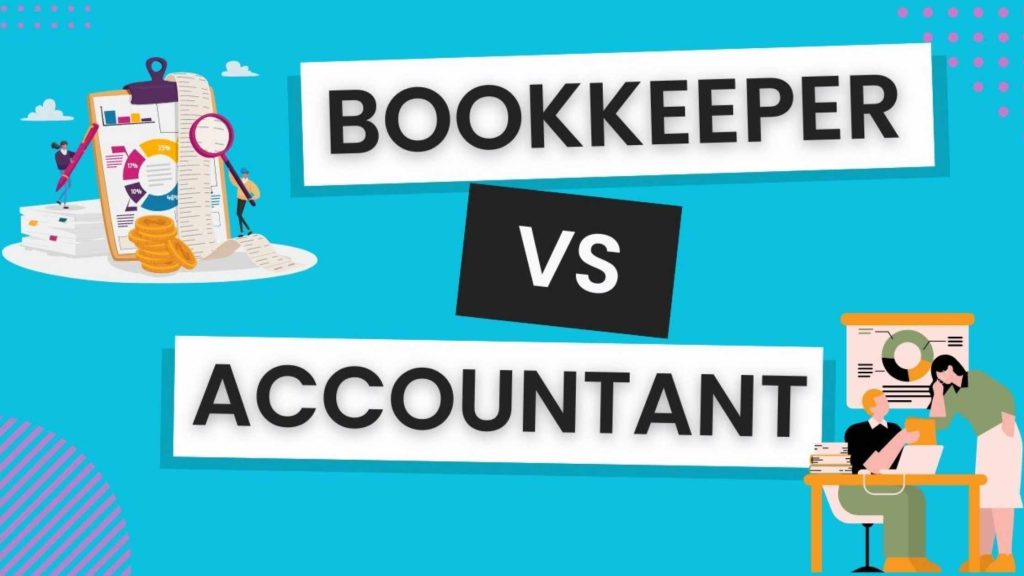Introduction
Finance management is a difficult task for businesses in this competitive world. Here, comes bookkeepers and accountants to help solve this problem. Business owners might be confused between a bookkeeper, an accountant, or both. Bookkeeper vs Accountant is an all-time debate. And knowing how these two differ and making the right decisions are vital for your business.
This blog will explore a bookkeeper’s and an accountant’s roles, their differences, and how they work together to keep your finances in shape.
Tasks a Bookkeeper Perform
A book is vital for your financial management. They keep accounting records accurate and up-to-date.

Key Bookkeeper’s Responsibilities:
- Recording accurate financial transactions including sales, expenses, and payments.
- Handling invoices, and bank reconciliations.
- Organizing financial data so that it’s readily available.
- Basic financial reports including income statements.
- Managing payroll records and salary reimbursement on time.
In short, bookkeepers manage routine finance details. They keep your financial records clean, organized, and ready for the accountant’s review.
What is an Accountant?
An accountant is a wider analytical approach to your finances. They give you insight using the data kept by the bookkeeper, prepare reports, and make strategic decisions on your behalf.

Accountant Responsibilities:
- Preparing accurate financial statements.
- Ensure your company aligns with tax laws and fill returns appropriately.
- Financial advisories aimed at growing or cutting costs on your business.
- Conduct audits on the accuracy of financial records.
- Long-term planning in finance and even forecasting.
A bookkeeper arranges data, while an accountant interprets the data to make informed decisions.
Also Read: Understanding Parasite SEO
Bookkeeper vs Accountant
While a book handler and an accountant overlap at times, they do differ in great areas of focus and scope. Let’s break it down:

| Aspect | Bookkeeper | Accountant |
|---|---|---|
| Main Role | Record and arrange financial data. | An analysis, interpretation, and informing of financial data. |
| Focus | Day-to-day transactions and recordkeeping. | Big-picture strategy and compliance. |
| Skills needed | Detail-oriented, organizational skills, basic accounting knowledge. | Advanced accounting knowledge, tax expertise, and financial planning. |
| Tax Preparation | Does not handle tax filing (but prepares the records). | Prepares and files tax returns. |
| Reporting | Creates basic financial reports. | Provides in-depth financial analysis and recommendations. |
How Bookkeepers and Accountants Work Together
A bookkeeper and an accountant have a mutualistic relationship. While a bookkeeper puts the base under your financial information, an accountant takes this information to the analytical stage and thus delivers insights about your financial matters.

Here is how their job responsibilities complement one another:
1. Uninterrupted flow of data:
A bookkeeper keeps the data clean and organized, making work easier for the accountant to present reports, file taxes, or draft forecasts. Without a bookkeeper, the accountant will have to spend time sorting messy records.
2. Effective Tax Compliance:
Bookkeepers record all your income, expenses, and receipts for the year. Thus, accountants will file the most accurate tax returns for you. This ensures you do not miss the deadline and avoid penalties.
3. Right Decision Making:
Bookkeepers provide raw data such as monthly sales figures or cash flow, and accountants interpret the same to ensure that you make informed decisions. This way, you will know your financial status.
4. Scalability:
As your business grows, so does the financial complexity. The growing volume of transactions is handled by bookkeepers and strategized with accountants on how to grow your business well.
Decide Between a Bookkeeper, an Accountant, or Both
It depends on your business needs, size, and goals.

You Might Need a Bookkeeper If:
- If you are a small business or startup, you need someone to handle daily financial matters.
- Your finances are unorganized, and your invoices or reconciliations are piling up.
- You want to get on top of your financial numbers without spending several hours a day.
You Could Use an Accountant If :
- You need help in preparing or submitting your taxes.
- You want access to strategic guidance on how to grow the business.
- You are in search of someone to conduct audits or handle compliance-related issues.
The Perfect Position: Both
The ideal solution for most companies would be hiring a bookkeeper and accountant. This way, your finances will be managed at operational and strategic levels. When starting up, you can hire a bookkeeper first and then bring in an accountant as your business grows.
Conclusion
The bookkeeper vs accountant debate on how one manages business finances is more of how they work together to keep your finances in order. A bookkeeper ensures your financial data will be clean while an accountant could utilize such data in making the right moves for your business towards growth.
For maximum efficiency, hire both. Appoint a bookkeeper for your day-to-day operations and an accountant if you need tax expertise, compliance assistance, or financial advice.
If you need an expert bookkeeper or accountant, visit Tasks Expert and find the perfect financial professional for your business needs!
Frequently Asked Questions
Not really, Book handlers keep accurate financial records but are not trained or certified to give tax advice, perform audits, etc.
Yes, but it is not the best use of their skills. Accountants focus on higher-level tasks, so they are comparatively costly. A bookkeeper is more cost-effective for daily financial management.
If you’re just starting up your business, hire a bookkeeper first. In this way, you’ll be able to have your records sorted out. Appoint an accountant when the businesses grow strategically.
About Us
Tasks Expert offers top-tier virtual assistant services from highly skilled professionals based in India. Our VAs handle a wide range of tasks, from part time personal assistant to specialized services like remote it support services, professional bookkeeping service etc. Furthermore, it helps businesses worldwide streamline operations and boost productivity.
Ready to elevate your business? Book a Call and let Tasks Expert take care of the rest.









